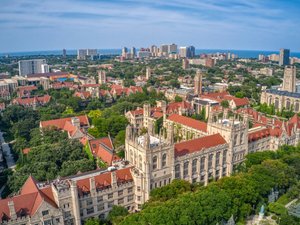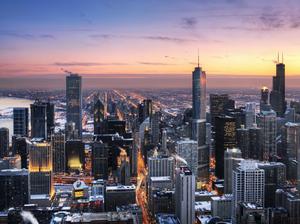
Unlike some other industries, tech companies have garnered a reputation for creating and maintaining outstanding offices, oftentimes putting unique design, personalization and comfort front and center.
Whether startup and tech companies are hiring artists to create company-branded murals or landscaping idyllic rooftop terraces outfitted with Wifi, they are prioritizing having an office that looks and feels good as they attract and retain talent.
But what goes into this process? How exactly are tech companies deciding the layout of their offices, the number of kitchens to add and the kinds of art they want on display?
Many Chicago tech founders and leaders have an idea of what they want their future offices to look like but still rely on the expertise of local firms like Partners by Design to help them bring their ideas to life.
PBD, founded in the early '90s, has solidified itself in Chicago as one of the top design firms for tech and startup offices. The firm has designed the offices of Peapod, SproutSocial, Braintree, and even local startup incubators like mHUB.

“Once we meet a client, there’s a lot of getting to know them and understanding their values and core principles, and what their culture is today and what they want it to be,” said Lisa Tvrdy, PBD’s creative director. “It’s fun to work with startups that have such rich stories to tell.”
When designing Peapod’s office, PBD wanted to make sure the office was food-focused since the company specializes in grocery delivery. That's why when employees come through the front door, they’re in the kitchen area. Elsewhere throughout the office, employees enjoy accent walls made out of Peapod delivery boxes and call rooms covered in banana art.
“[Tech companies] want spaces that are branded and unique to them,” said Andy Christensen, a partner at PBD. “Everyone wants to recruit and retain top talent in their industry, so everyone wants a space that inherently feels like it belongs to them.”
Christensen said startup and tech companies often ask for their offices to have natural light, outdoor space, and social spaces, like lunch and lounge areas. But personalizing startup offices and making them aesthetically appealing is just one part of the job. The other task is making them functional.
It is common for startups to lease office spaces that are larger than what they need—the idea being that as they grow, they will have room to add additional employees. In circumstances like these, Christensen said PBD configures offices so they are flexible for construction or repurposing.

“They could be huddle rooms on day one, but as you grow over the term of your lease, maybe those get converted over to private offices,” Christensen said. “A lot of what we’re doing is figuring out how you can live in the space on day one, but then how you can grow into the space over the course of a lease.”
To help make some of those more difficult construction decisions are contracting firms like Skender. The Chicago-based business has built offices for locally-based tech companies, such as ShopRunner, HERE Technologies, Braintree and Motorola Mobility. It has also built Facebook, Glassdoor and Google’s Chicago offices.
Clay Edwards, the vice president at Skender who runs the firm’s commercial interiors department, said the main difference he has noticed in working with startup and tech companies as opposed to established, corporate companies, is that they, of course, are typically on a budget.
“Until you are a publicly-traded tech company, it’s about making the numbers work while still trying to grow and attract talent,” he said.
While drafting an office layout for Chicago startup Upwork, Edwards helped the company make cost-cutting decisions.
“The big thing with Upwork was analyzing tons of different scenarios,” Edwards said. “Do we paint everything on the ceiling or do we leave it exposed? Because painting it comes with a cost.”
“Luckily in the tech world, sometimes leaving that raw, untouched space is attractive. Plus, it helps with the budget,” Edwards continued.

Another cost-cutter is opting for an open floor plan. Though the design has roots in fostering teamwork, Edwards said it has evolved into more of a money-saving mechanism, and that even corporate companies are now choosing the layout.
“The latest trend to go open office now by the corporate world is driven by cost of real estate, but when the tech world started it, it was driven by collaboration, interaction and working together,” Edwards said.
Though Edwards, who has worked in the contracting business for more than two decades, said he enjoys the glossy and polished designs of more traditional businesses, like law firms and banks, he still jumps at the opportunity to build a tech office.
“I like both sides of the equation,” he said. “But startups are fun, fast-paced and ever-changing.”








